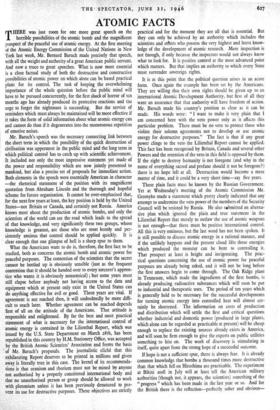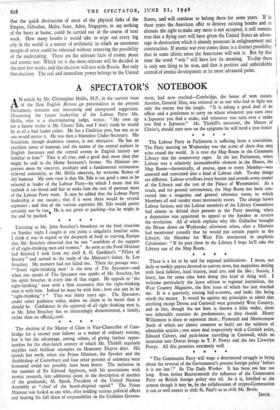ATOMIC FACTS
THERE was just room for one more great speech on the horrible possibilities of the atomic bomb and the magnificent prospect of the peaceful use of atomic energy. At the first meeting of the Atomic Energy Commission of the United Nations in New York last week, Mr. Bernard Baruch made precisely that speech, with all the weight and authority of a great American public servant. And now a truce to great speeches. What is now most essential is a close factual study of both the destructive and constructive possibilities of atomic power on which alone can be based practical plans for its control. The task of keeping the overwhelming importance of the whole question before the public mind will have to be pursued concurrently, for the first shock of horror of ten months ago has already produced its protective reactions and the urge to forget the nightmare is succeeding. But the service of reminders which must always be maintained will be more effective if it takes the form of solid information about what atomic energy can and cannot do than if it degenerates into the monotonous repetition of emotive noises.
Mr. Baruch's speech was the necessary connecting link between the short term in which the possibility of the quick destruction of civilisation was uppermost in the public mind and the long term in which political control has to catch up with scientific achievement. It included not only the most impressive statement yet made of the power and responsibility which are now jointly presented to mankind, but also a precise set of proposals for immediate action. Both elements in the speech were essentially American in character —the rhetorical statement of the position with its magnificent quotation from Abraham Lincoln and the thorough and hopeful scheme for future organisation. It cannot be over-emphasised that, for the next few years at least, the key position is held by the United States—not Britain or Canada, and certainly not Russia. America knows most about the production of atomic bombs, and only the scientists of the world can see the road which leads to the spread of that knowledge, and very significantly these two groups, whose knowledge is greatest, are those who are most keenly and per- sistently anxious that control should be applied quickly. It is clear enough that one glimpse of hell is a sharp spur to them.
What the Americans want to do is, therefore, the first fact to be studied, both as concerns the atomic bomb and atomic power for peaceful purposes. The contention of the scientists that the secret cannot be bottled up is obviously sensible (just as the frequent contention that it should be handed over to every sorcerer's appren- tice who wants it is obviously nonsensical) ; but some years must still elapse before anybody not having access to the data and equipment which at present only exist in the United States can do anything effective for evil or good. These years are vital. If agreement is not reached then, it will undoubtedly be more diffi- cult to reach later. Whether agreement can be reached depends first of all on the attitude of the Americans. That attitude is responsible and enlightened. By far the best and most practical statement of what is necessary for the international control of atomic energy is contained in the Lilienthal Report, which was issued by the U.S. State Department on March 28th, has been republished in this country by H.M. Stationery Office, was accepted by the British Atomic Scientists' Association and forms the basis - of Mr. Baruch's proposals. The journalistic cliché that this exhilarating Report deserves to be printed in millions and given away is literally true in this case. The kernel of its recommenda- tions is that uranium and thorium must not be mined by anyone not authorised by a properly constituted international body and that no unauthorised person or group should be allowed to work with plutonium unless it has been previously denatured to pre- vent its use for destructive purposes. These objectives are strictly practical and for the moment they are all that is essential. But they can only be achieved by an authority which includes the scientists and others who possess the very highest and latest know- ledge of the development of atomic research. Mere inspection is not enough, if only because the inspectors would not always know what to look for. It is positive control at the most advanced point which matters. But that implies an authority to which every State must surrender sovereign rights.
It is at this point that the political question arises in an acute form. Once again the example has been set by the Americans. They are willing that their own rights should be given up to an international Atomic Development Authority, but first of all they want an assurance that that authority will have freedom of action. Mr. Baruch made his country's position as clear as it can be made. His words were : " I want to make it very plain that I am concerned here with the veto power only as it affects this particular problem. There must be no veto to protect those who violate their solemn agreements not to develop or use atomic energy for destructive purposes." The fact is that if any great power clings to the veto the Lilienthal Report cannot be applied. This fact has been recognised by Britain, Canada and several other Powers and the retention of the veto in this field is opposed by them. If the right to destroy humanity is not foregone (and why in the name of everything sacred and profane should it not be foregone?) there is no hope left at all. Destruction would become a mere matter of time, and it could be a very short time—say five years.
These plain facts must be known by the Russian Government. Yet at Wednesday's meeting of the Atomic Commission Mr. Gromyko made a statement which pretty clearly indicated that any attempt to undermine the veto power of the members of the Security Council will be resisted by Russia. He also submitted an alterna- tive plan which ignored the plain and true statement in the Lilienthal Report that merely to outlaw the use of atomic weapons is not enough—that there must be positive international control. All this is very ominous, but the last word has not been spoken. It is still possible to discuss atomic energy in a rational manner, and if the unlikely happens and the present cloud lifts those energies which produced the monster can be bent to controlling it. That prospect at least is bright and invigorating. The prac- tical questions concerning the use of atomic power for peaceful purposes are already being asked, and it will not be long before the first answers begin to come through. The Oak Ridge plant in Tennessee, which made the ingredients of the first bombs, is already producing radioactive substances which will soon be put to industrial and therapeutic uses. The period of ten years which is generally held to be necessary for the successful developments for turning atomic energy into controlled heat will almost cer- tainly be shortened. The information on costs of production and distribution which will settle the first and critical questions whether industrial and domestic power (produced in large plants, which alone can be regarded as practicable at present) will be cheap enough to replace the existing sources already exists in America, and will soon be firm enough to give the experts on public utilities something to bite on. The work of discovery is stimulating in itself, quite apart from the strong hope of a successful outcome.
If hope is not a sufficient spur, there is always fear. It is already common knowledge that bombs a thousand times more destructive than that which fell on Hiroshima are practicable. The experiment at Bikini atoll in July will at least tell the American military authorities (though not, it appears, the scientists) something of the " progress " which has been made in the last year or so. And for the British there is the reflection—perfectly sober and obvious- that the quick destruction of most of the physical links of the Empire, Gibraltar, Malta, Suez, Aden, Singapore, to say nothing of the bases at home, could be carried out in the course of next week. How many bombs it would take to wipe out every big city in the world is a matter of arithmetic in which an enormous margin of error could be tolerated without removing the possibility of the undertaking. These are the relevant facts of atomic peace and atomic war. Which set is the more relevant will be decided in the next few weeks, and that decision will rest with Russia. But only that decision. The real and immediate power belongs to the United States, and will continue to belong there for some years. If in these years the American offer to destroy existing bombs and to alienate the right to make any more is not accepted, it still remains true that a flying start will have given the United States an advan- tage in destruction which it already possesses in enlightenment and construction. If atomic war ever comes there is a distinct possibility that in some idiotic sense the Americans will win it. But by that time the word " win " will have lost its meaning. To-day there is only one thing to be won, and that is positive and unbreakable control of atomic development at its most advanced point.



























 Previous page
Previous page